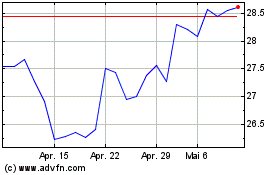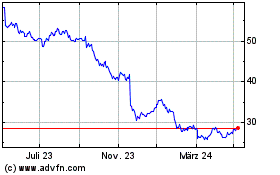Bayer Settles Claims Over Birth-Control Device for $1.6 Billion -- WSJ
21 August 2020 - 9:02AM
Dow Jones News
By Sara Randazzo
This article is being republished as part of our daily
reproduction of WSJ.com articles that also appeared in the U.S.
print edition of The Wall Street Journal (August 21, 2020).
Bayer AG said Thursday it will pay $1.6 billion to settle claims
that its birth control device Essure causes serious health
complications, the latest in a string of settlements by the German
company to resolve litigation it faces in the U.S.
Nearly 39,000 women had sued Bayer or hired lawyers over their
use of Essure, a fallopian tube implant that prevents pregnancies.
Bayer said it has already reached deals with lawyers representing
90% of those plaintiffs, and that the money is expected to cover
the entirety of the claims.
Bayer stopped selling Essure in the U.S. at the end of 2018, two
years after a decision by the Food and Drug Administration
requiring the device to come with prominent boxed warnings about
potential serious side effects.
The FDA later required patients and doctors to sign a form
accepting risks associated with Essure.
The warnings caused Essure sales to drop, and Bayer said at the
time it was pulling the product because of lack of consumer
interest. By 2017, Bayer had already discontinued sales of the
contraceptive in 20 other countries.
Thursday's settlement came with no admission of wrongdoing or
liability from Bayer. The company said it stands by Essure's safety
and efficacy and was resolving the cases so it could focus on
women's health "without the distractions and uncertainties
associated with this litigation."
Fidelma Fitzpatrick, the lead lawyer for the plaintiffs, said
that while the money is a welcome result for her clients, "it's
also an incredibly important case to stress the need for full
disclosure and transparency when people's health is at stake."
Bayer bought Essure's creator, Conceptus Inc., for $1.1 billion
in 2013, saying at the time it was looking to bolster its flagging
birth-control division. The device first received FDA approval in
2002.
The U.S. litigation started around 2014, with plaintiffs
alleging Essure caused complications ranging from allergic
reactions and chronic pelvic pain to the need for a hysterectomy,
and even death. Essure is a metal-and-polyester coiled device that
gets implanted in the fallopian tubes, where it causes inflammation
and tissue growth to block the pathway between sperm and egg.
Unlike other permanent contraceptives, it doesn't require any
surgical incisions.
The first trial was poised to begin in March before getting
delayed because of the coronavirus pandemic. Settlement talks began
about a year ago, Ms. Fitzpatrick said.
Bayer has been on a settlement spree in recent months. In June,
the company said it would pay up to $10.9 billion to resolve tens
of thousands of lawsuits claiming its Roundup weedkiller causes
non-Hodgkin lymphoma. At the same time, it also said it would pay
up to $400 million to resolve legal challenges and crop-damage
claims to another of its herbicides, dicamba, which the company has
marketed to kill weeds that have evolved to resist Roundup.
Bayer inherited the Roundup cases with its 2018 purchase of
Monsanto Co., a deal that came under intense scrutiny after three
California juries returned massive awards in Roundup trials.
Write to Sara Randazzo at sara.randazzo@wsj.com
(END) Dow Jones Newswires
August 21, 2020 02:47 ET (06:47 GMT)
Copyright (c) 2020 Dow Jones & Company, Inc.
Bayer (TG:BAYN)
Historical Stock Chart
Von Mär 2024 bis Apr 2024

Bayer (TG:BAYN)
Historical Stock Chart
Von Apr 2023 bis Apr 2024
